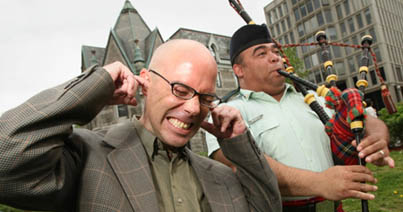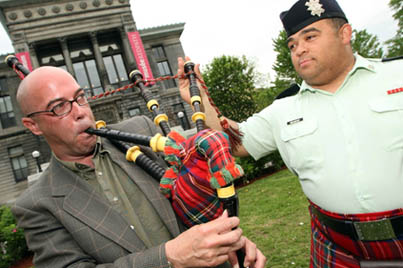Bourguignon Beat: Meet the proud piper of Convocation
Bourguignon Beat: Meet the proud piper of Convocation McGill University
User Tools (skip):
BOURGUIGNON BEAT
Meet the proud piper of Convocation

Pumping up the pomp: The skirl of the bagpipes might be an acquired taste, but it's long been part of McGill's Convocation ceremonies.
Owen Egan
The skirl of the bagpipes - along with the swirl of hundreds of proud parents and family members suddenly descending on lower campus - is one of the tell-tale signs that Convocation is here again.
McGill hires a team of three professional pipers to add pomp to the march of the gowned graduates, their professors and various university dignitaries along the main road from the Arts Building to the Convocation tent.
At the helm of this team is Jeff McCarthy, a now familiar face on campus after seven years playing the pipes for McGill.
"For years before that, I always wondered why they didn't have a piper," said McCarthy, a 40-year-old Master Corporal in the Black Watch (Royal Highland Regiment) of Canada who has been piping for close to 20 years.
"At one point, I was teaching a student whose mother worked at McGill and that's how this all started."
McCarthy's primary role is to pipe in the platform party at the beginning of the ceremonies and to pipe them out again at the end. It's not difficult work - though it can get a bit stuffy wearing a kilt and military dress on hot days - but it's not without its occupational hazards.
"I have a new reed on my bagpipes, which makes them a bit more difficult to play," McCarthy said. "If I make a mistake by missing a grace note, most people won't catch on, but if I miss a note while playing 'Scotland the Brave,' people are going to notice."
The key, he said, is not to get stressed about potential missteps. That and, of course, practice, practice, practice.
"I try to practice at least half an hour a day; that's the bare minimum," said McCarthy, who also plays pipes for the Black Watch and Ogilvy's downtown, and has served as both Pipe Sergeant and Pipe Major of the 78th Fraser Highlanders, at the old fort on Île Ste-Hélène.
"It's hard to convince a lot of people that you can make a living playing bagpipes, but I'm a bit of an optimist and I have a lot of guardian angels," he said. "When something comes down the pipes - no pun intended - and they need a bagpiper, they know they can count on me."
It was McCarthy's father, an Irish-Acadian salesman with nary a drop of Scottish blood in him, who first suggested his son take up the pipes.
"When I was 17, I was working at the Stewart Museum and Dad worked for Weider, a Black Watch pipe major. He just said to me one day, 'Why don't you learn to play?' I had no musical ability, but I spent a couple of summers listening to pipe music and it lit something in me."
He eventually decided to take lessons and, in 1989, realized his dream of joining the 78th Fraser Highlanders, launching a military and piping career that's still going strong today.
Contrary to what most seem to believe, McCarthy insists the bagpipes are not too difficult to play. In fact, he was teaching others within just a few years of having picked up the instrument himself.
Of course, playing well is by no means easy - as I found out during a break between Convocation ceremonies.
"You need strong face muscles, because it's the cheeks and the sides of the mouth that control the blowing," he said, offering the first of several pointers.
Step one is to position the long bass drone securely against your neck. Step two is to position the bag under your arm. Steps three through infinity are to blow.
At some point, there's fingering involved, but I don't quite get there on my first try - until McCarthy volunteers to do the blowing part, pumping blasts of air and squeezing the bag at regular intervals while I attempt to screech out a few notes of "Amazing Grace."
It's an involved process and not for the faint of heart, nor the faint of lung.
"Someone who has never played before won't be able to play for more than five seconds," he said. "The main thing is to keep at it, but not to overdo it. Luckily, I have good neighbours who don't seem to mind."

Thar he blows! Michael Bourguignon squeaks, squeals and squawks a few notes under the watchful eye of Convocation piper and Black Watch Master Corporal Jeff McCarthy.
Owen Egan

